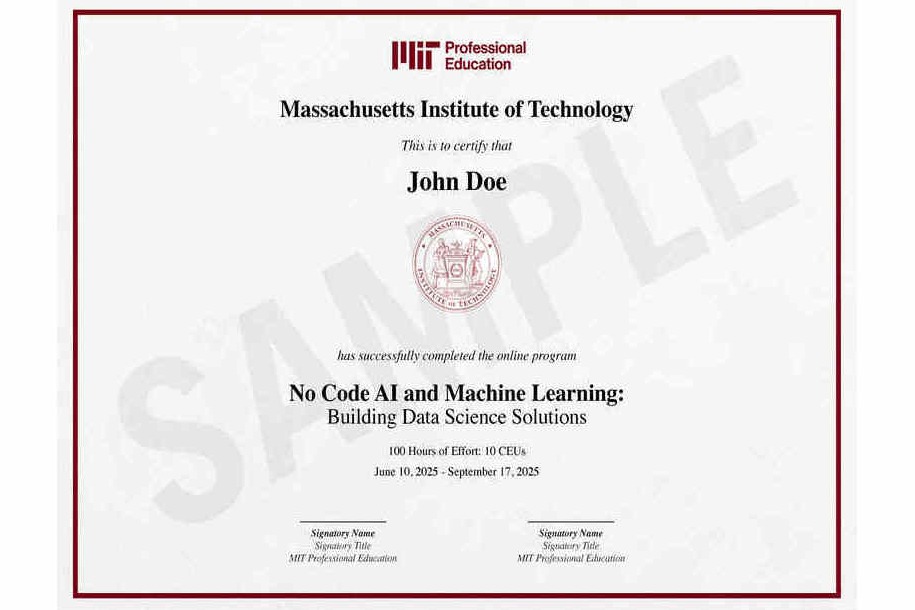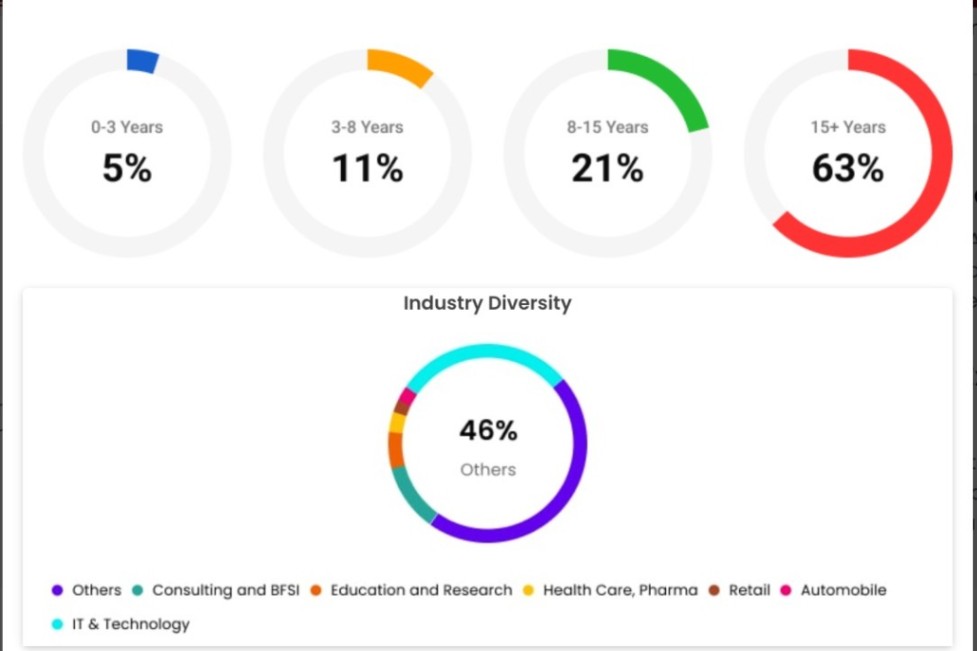Learn more about the course
Get details on syllabus, projects, tools, and more

Top rated online No Code AI and ML Course
Application closes 19th Feb 2026
Why No Code AI?
-

Booming Industry Demand
AI has become a critical component of business, and no-code platforms are closing the gap by enabling professionals to build AI solutions without technical expertise
-

The No Code Advantage
Mastering no code AI tools, allowing technical and non-technical professionals to lead innovation initiatives without relying on data science teams
PROGRAM OUTCOMES
Elevate your career with no-code AI
Leverage ML, Gen AI and advanced Agentic AI, without writing a single line of code
-
Transform data into actionable insights using intuitive, no code platforms.
-
Rapidly prototype, test, and operationalize machine learning models without writing code.
-
Leverage supervised and unsupervised learning, recommendation systems, deep learning, and computer vision.
-
Utilize Generative AI, Prompt Engineering, and Agentic AI to design intelligent, autonomous workflows.
Earn a certificate of completion by MIT Professional Education
KEY PROGRAM HIGHLIGHTS
Why choose this program
-

Learn from MIT faculty
Learn from the vast knowledge of 5 award-winning MIT faculty and instructors through recorded sessions.
-

Industry-relevant Curriculum
Get access to Generative AI modules on Prompt Engineering, Retrieval Augmented Generation (RAG), and Agentic AI.
-

Build your AI Portfolio
Build a portfolio featuring 3 industry-relevant projects to showcase your practical AI capabilities.
-

Personalized Mentorship Sessions
Get mentorship from industry experts in Data Science and Artificial Intelligence based on the concepts taught by MIT faculty.
-

Dedicated Program Support
Connect with dedicated program managers to assist with queries and guide you throughout the course.
-

Innovate With No Code Tools
Gain the skills to design and deploy AI-driven solutions using no code platforms like RapidMiner, and Teachable Machine.
Skills you will learn
Artificial Intelligence
Machine Learning
Deep Learning
Prompt Engineering
Data Analysis
Generative AI
Agentic AI
Retrieval-Augmented Generation (RAG)
Data Visualization
Computer Vision
Supervised and Unsupervised Learning
Model Evaluation & Tuning
Recommendation Systems
Responsible AI
Artificial Intelligence
Machine Learning
Deep Learning
Prompt Engineering
Data Analysis
Generative AI
Agentic AI
Retrieval-Augmented Generation (RAG)
Data Visualization
Computer Vision
Supervised and Unsupervised Learning
Model Evaluation & Tuning
Recommendation Systems
Responsible AI
view more
- Overview
- Learning Journey
- Curriculum
- Projects
- Tools
- Certificate
- Faculty
- Reviews
- Fees
- FAQ

This program is ideal for
Professionals from technical and non-technical backgrounds ready to advance their skills in AI
View Batch Profile
-
Non-Tech Professionals Entering AI
Learn to drive AI initiatives, lead AI and data-driven teams, and spearhead innovation using AI technologies using no code tools.
-
Leaders Leveraging AI for Innovation
Understand how AI and Machine Learning solutions are developed and integrated to accelerate business growth and drive innovation.
-
Managers Driving Rapid AI Deployment
Discover how to quickly build and launch AI-powered solutions and prototypes without heavy reliance on large data science teams.
-
Consultants Expanding into AI Strategy
Build working prototypes or early solutions without needing large data teams, using no code platforms, and hands-on prototyping.
Experience a unique learning journey
Our pedagogy is designed to ensure career growth and transformation
-
Learn from world-renowned faculty
Learn critical concepts through recorded video lectures from award-winning MIT professors
-
Engage with your mentors
Participate in live sessions led by industry experts and build application-ready skills
-
Work on hands-on projects
Build a portfolio of industry-relevant projects and 20+ case studies to showcase skills
-
Get personalized assistance
Our dedicated program managers will support you through your learning journey
Curriculum
The industry-relevant curriculum includes modules covering Generative AI concepts on Prompt Engineering, Retrieval Augmented Generation (RAG), and Agentic AI, equipping professionals to apply AI solutions using intuitive no-code tools.
Pre-work: Introduction to Data Science and AI
This is a foundational step in your program journey. It'll get you acquainted with the Data Science and AI world and equip you with basic No Code tool skills, thereby laying a foundation for learning throughout the program. Discovering the fascinating history of Data Science and AI Transforming industries through Data Science and AI The math and stats underlying the technology Navigating the Data Science lifecycle Introduction to AI Studio (RapidMiner) and KNIME
Week 1: Introduction to the AI and Generative AI Landscape
In this week, you will embark on an insightful journey through the evolving world of artificial intelligence. You’ll explore AI’s history, its role in organizations, data operations, and strategic approaches to building AI products for driving innovation and efficiency. AI and generative AI landscape: history and landscape Organizations, people, and data Data operations in various organizations Strategy for building AI products
Week 2: Data Exploration - Structured Data
In this week, you will gain practical insights into analyzing and interpreting structured data using advanced techniques. By mastering these methods, you'll be well-prepared to apply data exploration techniques to drive data-driven decisions and insights within your organization, significantly enhancing your strategic and analytical capabilities. Clustering (K-means clustering, K-medoids, Gaussian mixture) Dimensionality reduction techniques (PCA, t-SNE)
Week 3: Prediction Methods – Regression
In this week, you’ll explore regression techniques like Linear Regression, K-Fold Cross-Validation, Bootstrapping, and LOOCV to build accurate predictive models. You’ll also learn to validate assumptions and enhance model reliability for data-driven forecasting. Linear Regression Assumptions of Linear Regression K-Fold CV Bootstrapping LOOCV
Week 4: Decision Systems
In this week, you’ll dive into classification techniques like Decision Trees and Random Forests to make accurate predictions from categorical data. You'll also learn to evaluate model performance using the Confusion Matrix, Information Gain, and the Bias-Variance trade-off. Decision tree Bagging Random forests
Week 5: Project Week - Machine Learning Classification
Week 6: Recommendation Systems
In this week, you will learn to develop powerful tools that personalize user experiences, a key asset in today's data-driven landscape. You’ll explore Recommendation Systems through clustering, collaborative filtering, rank-based, and content-based methods to design impactful, user-centric solutions. Recommendation systems: problem statements and solutions Clustering-based recommendation systems Collaborative filtering Rank-based and content-based techniques
Week 7: Prediction Methods – Neural Networks
In this week, you’ll embark on an exploration of deep learning, mastering core concepts, neural network building blocks, and training techniques. You'll apply your knowledge to a practical case study in Digit Recognition, mastering a classic deep learning application. Introduction to deep learning Building blocks of neural networks Training neural networks Digit recognition case study
Week 8: Computer Vision Methods
In this week, you'll dive into the fascinating world of machines that can see and interpret visual data. You’ll explore CNN building blocks, training techniques, and practical applications like image detection and object recognition. Drawbacks of artificial neural networks (ANNs) Building blocks of convolutional neural networks (CNNs) Training convolutional neural networks Image detection
Week 9: Project Week - Neural Networks
Week 10: Generative AI Foundations
In this week, you’ll learn the foundational concepts of Generative AI, beginning with an exploration of its origins and the underlying principles behind generating new data. You’ll also explore matrix estimation perspectives, large language models as probabilistic sequence predictors, and key prompt engineering techniques Origins of generating new data Generative AI as a matrix estimation problem Large language models as probabilistic models for sequence completion Prompt engineering
Week 11: Business Applications of Generative AI
In this week, you’ll dive into the business applications of Generative AI, including Retrieval-Augmented Generation (RAG) for improving response relevance and Agentic AI for autonomous decision-making. Natural language tasks with generative AI Summarization, classification, and generation Retrieval-augmented generation (RAG) Agentic AI
Week 12: Ethical and Responsible AI
In this week, you’ll explore the ethical and responsible development of AI systems, from the AI lifecycle to addressing bias, causality, and privacy concerns. You’ll also examine how AI components interconnect and influence each other across various domains and complex systems. Introduction to the AI lifecycle Introduction to bias and its examples Introduction to causality and privacy Interconnections and domains Interdependency and feedback in AI systems
Self-Paced Modules
In these self-paced modules, you'll learn to navigate and extract insights from unstructured data, a crucial competency in today's data-rich environment. You will also explore the specialized techniques needed to analyze time-dependent data, a vital skill for predicting trends and making strategic decisions. Data Exploration: Unstructured Data (text processing, sentiment analysis, text classification) Data Exploration: Temporal Data (time series methods, ARIMA modeling)
Projects and Case Studies
Hands-on practice ensure that learners gain tangible outcomes and highly effective skills.
-
3
hands-on projects
-
20+
case studies
No code tools covered
Gain hands-on experience with no code tools to optimize models and build innovative solutions
-

KNIME
-

RapidMiner
-

Teachable Machine
-

ChatGPT
-

Gemini
-

NotebookLM
-

Dall.E
Earn a Certificate of Completion from MIT Professional Education
Certificate of Completion from MIT Professional Education upon successful completion of the program

* Image for illustration only. Certificate subject to change.
Program Faculty
Meet our expert faculty & professionals with in-depth AI & ML knowledge and a passion to help you succeed
Course Fees
Invest in your career USD 2,850
Course fees
-

Transform data into actionable insights using intuitive, no code platforms.
-

Rapidly prototype, test, and operationalize machine learning models without writing code.
-

Leverage supervised and unsupervised learning, recommendation systems, deep learning, and computer vision.
-

Utilize Generative AI, Prompt Engineering, and Agentic AI to design intelligent, autonomous workflows.
Third Party Credit Facilitators
Check out different payment options with third party credit facility providers
*Subject to third party credit facility provider approval based on applicable regions & eligibility
Application Process
Admissions close once the required number of participants enroll. Apply early to secure your spot
-

1. Fill application form
Apply by filling a simple online application form.
-

2. Application Screening
A panel from Great Learning will review your application to determine your fit for the program.
-

3. Join program
After a final review, you will receive an offer for a seat in the upcoming cohort of the program.
Batch start date
-
Online · 14th Mar 2026
Admission closing soon
Delivered in Collaboration with:

MIT Professional Education is collaborating with online education provider Great Learning to offer No Code AI and Machine Learning: Building Data Science Solutions. This program leverages MIT's leadership in innovation, science, engineering, and technical disciplines developed over years of research, teaching, and practice. Great Learning collaborates with institutions to manage enrollments (including all payment services and invoicing), technology, and participant support. Accessibility
Frequently asked questions
What is the required weekly time commitment?
The program consists of 10 modules, totaling approximately 80 study hours. Most participants can expect to spend an average of 6 to 12 hours per week on program activities.
Is the program completely virtual?
Yes. The program is delivered entirely online, allowing you to learn from anywhere. It is designed to meet the needs of working professionals and enables you to develop practical skills in AI and machine learning over a 12-week period.
What are the best No Code AI tools in the market?
What is the application of no-code AI in different industries?
No-code AI enables a wider range of business professionals to develop automation solutions and create software applications without prior coding experience. Organizations across sectors such as IT services, education, BFSI, marketing and advertising, FMCG, and manufacturing have adopted no-code AI and machine learning approaches. Here’s how leading industries are leveraging no-code AI approaches:
Finance: Streamlines processes such as loan approvals and customer experience management. No-code AI helps predict financial risks, anticipate customer churn, and design personalized customer experiences.
Marketing: Supports data analysis and model-building to inform strategic decisions. For example, marketers can segment customer data and lifetime value to tailor targeted campaigns on platforms like Facebook.
Healthcare: Facilitates collaboration between doctors and patients by providing deeper insights into patient health. No-code AI tools enable healthcare professionals to develop customized solutions for patient care.
Education: Helps track courses and manage admissions efficiently. Schools and universities can use no-code AI to handle workloads, expand outreach to students, and improve operational efficiency.
Technology: Enhances cybersecurity by tracing the origin of cyberattacks. Tech professionals can use no-code AI platforms to detect threats and block attackers using data such as port maps.
Will this program provide similar career outcomes to a program that includes coding like Python?
Yes. The career outcomes of this program are comparable to those of a traditional data science program. You will develop the capability to design data-driven solutions, interpret AI outputs, and apply problem-solving skills to real-world use cases in artificial intelligence and machine learning. While Python and other coding tools are commonly used in traditional programs, this program leverages no-code AI platforms to implement solutions, so programming skills are not required during the learning journey.
What kinds of projects and case studies will I work on in this program?
The case studies and projects are based on multiple industry sectors, including Education, Healthcare, IT, Finance, Retail, Research, and many more.
Does the program reflect the latest technology developments in No Code AI?
Will I receive a transcript or grade after completion of the program?
Participants receive performance marks for each assessment and module to evaluate their understanding and determine eligibility for the certificate. Upon successful completion of the program by achieving a minimum score of 80 percent in each module, you will be awarded a Certificate of Completion from MIT Professional Education.
Will I have to spend extra on books, virtual learning materials, or license fees?
No. All required learning materials are provided online through the program’s Learning Management System. However, because the field of AI is vast and constantly evolving, a list of recommended books and additional resources will be provided for those who wish to explore topics in greater depth.
Can my employer sponsor the program fee?
We accept corporate sponsorships and can assist you with the process. For more information, please reach out to us at ncai.mit@mygreatlearning.com.
What is the refund policy?
Please note that submitting the registration fee does constitute enrolling in the program, and the below cancellation penalties will be applied. If you are unable to attend your program, please review our dropout and refund policies below:
- Dropout requests received within 7 days of enrollment and more than 42 days prior to the commencement of the program will incur no fee. Any payment received will be refunded in full.
- Dropout requests received more than 42 days prior to the program but more than 7 days after the acceptance are subject to a cancellation fee of USD 250.
- Dropout requests received 22-41 days prior to the commencement of the program are subject to a cancellation fee equal to 50% of the program fee.
- Any dropout requests received fewer than 22 days prior to the commencement of the program are subject to a cancellation fee equal to 100% of the program fee.
- No refund will be made to those who do not engage in the program or leave before completing a program for which they have been registered.
What are my payment options?
For further details, please get in touch with us at ncai.mit@mygreatlearning.com.
What are the prerequisites for this No Code AI and Machine Learning program?
What skills are needed to excel in no-code AI?
No programming or advanced mathematics knowledge is required to participate in the No Code AI and Machine Learning: Building Data Science Solutions Program. Familiarity with basic statistics and mathematics is recommended to maximize your learning experience and effectively apply the concepts taught in the program.
What is the Application process?
To apply, complete the online application form. The Great Learning program team will review your submission to assess your fit for the program. If selected, you will receive an offer for the upcoming cohort and can secure your seat by completing the program fee payment.
Why no code AI and machine learning?
Businesses are starting to adopt no-code approaches to reduce costs, improve the efficiency of their existing solutions, and accelerate time to market. The no-code approach enables AI and ML for everyone, making processes more scalable. Even professionals with no coding experience can now apply these advanced technologies to build intelligent solutions and help make informed decisions.
What is the future of no-code AI and machine learning?
The post-pandemic shift has led to increased adoption of digital technologies. Gartner projects a 23% increase in the global market for no-code tools and development. There is a steady growth in the use of no-code approaches due to their effectiveness in addressing some of tech’s most significant challenges—digitizing workflows, improving customer and employee experiences, and boosting the efficiency of operational teams
Batch Profile
The Data Science and Machine Learning class consists of working professionals from excellent organizations and backgrounds maintaining an impressive diversity across work experience, roles and industries.




 Speak with our expert
Speak with our expert



























